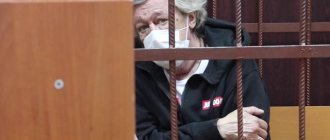Article 108 of the Labor Code of the Russian Federation: general comments
The requirements defined in Article 108 of the Labor Code of the Russian Federation arise from labor protection standards. In this case, legislators’ concern for employees is expressed in granting them the right to have lunch breaks during the performance of their work duties.
Formally, lunch breaks should be used for rest and eating. At the same time, no one is obligated to control exactly how an employee uses them. That is, breaks are allowed, and what the employee does during this time is at his discretion.
The procedure for providing breaks depends on the operating mode of the organization and the specifics of the labor functions performed by the employee.
Breaks under art. 108 of the Labor Code of the Russian Federation must be reflected in internal regulations relating to the labor regulations of the organization.
imprisonment for a term of at least six months with confiscation of all or part of the property.
132.
Carrying out actions provided for in Art. Art. 128–131 of this Code, in a combat situation or related to the supply of supplies to the Red Army and Navy and which may affect their combat effectiveness, -
imprisonment for a term of at least two years. (October 31, 1927 (SU No. 110, Art. 737)).
133.
Violation by the employer, both private individuals and relevant persons of state or public institutions and enterprises, of laws regulating the use of labor, as well as laws on labor protection and social insurance—
corrective labor for up to six months or a fine of up to three hundred rubles.
If this violation involves a group of workers of at least three people, is homogeneous in its composition in relation to all persons included in this group, and is committed against all of them at the same time -
imprisonment or correctional labor for up to one year or a fine of up to ten thousand rubles.
Placing an employee, in violation of labor protection rules, in such working conditions under which he lost or could lose his ability to work -
imprisonment for a term of up to two years or corrective labor for a term of up to one year or a fine of up to five hundred rubles.
Violation of rules on labor protection, safety precautions, industrial sanitation and hygiene established by local authorities in the manner of mandatory regulations, as well as resolutions, orders and instructions of the People's Commissariat of Labor [36],—
corrective labor for up to one month or a fine of up to one hundred rubles, imposed administratively.
133-a.
Refusal to hire women for reasons of pregnancy, as well as refusal to hire mothers who are breastfeeding, or reduction of wages for the same reasons -
corrective labor for up to six months or a fine of up to one thousand rubles.
If these violations are repeated, the punishment may be increased to two years in prison. (Decree of the Presidium of the Supreme Soviet of the RSFSR dated July 12, 1949 (“Gazette of the Supreme Soviet of the USSR” 1949 No. 35)).
134.
Violation by an employer of collective agreements, tariff agreements and agreements of conciliation chambers concluded by him with a trade union, if the malicious nature of the violation is established during the proceedings in a judicial or conciliatory manner, -
measures specified in parts 1 and 2 of Article 133.
135.
Obstructing the legal activities of factory and local committees, trade unions and their authorized representatives -
imprisonment or correctional labor for up to one year or a fine of up to one thousand rubles.
Chapter Six
Crimes against life, health, freedom and dignity of the individual
* 136.
Intentional murder committed: a) out of greed, jealousy (if it does not fit the criteria of Article 138) and other base motives, b) by a person who was previously convicted of intentional murder or bodily injury and who has served a social protection measure prescribed by the court, c) in a manner , dangerous to the lives of many people or especially painful for the murdered person, d) with the aim of facilitating or concealing another serious crime, e) by a person whose duty was to take special care of the murdered person, or f) taking advantage of the helpless position of the murdered person, entails -
imprisonment for up to ten years[37].
Murder committed by a military serviceman, under especially aggravating circumstances, -
capital punishment - execution. (September 1, 1934 (SU No. 34, Art. 206))
137.
Intentional murder committed without those specified in Art. 136 signs, -
imprisonment for a term of up to eight years.
138.
Intentional murder committed in a state of sudden strong emotional excitement caused by violence or severe insult on the part of the victim -
imprisonment for a term of up to five years or correctional labor for a term of up to one year.
* 139.
Murder by negligence, as well as murder resulting from exceeding the limits of necessary defense—
imprisonment for a term of up to three years or correctional labor for a term of up to one year.
* 140.
Performing abortions outside of hospitals or other medical institutions will result in a prison sentence of one to two years for the abortionist.
Performing abortions in unsanitary conditions or by persons without special medical education is punishable by imprisonment for a term of not less than three years[38]. (Decree of the Presidium of the Supreme Soviet of the RSFSR on January 11, 1956).
* 140-a.
Forcing a woman to have an abortion -
imprisonment for up to two years. (May 10, 1937 (SU No. 6, Art. 40)).
140-b.
Canceled. (Decree of the Presidium of the Supreme Soviet of the RSFSR, September 2, 1954).
141.
Bringing a person who is financially or otherwise dependent on another person, through cruel treatment of the latter or in any other similar way, to suicide or attempted suicide -
imprisonment for up to five years.
Assisting or inciting the suicide of a minor or a person who is obviously incapable of understanding the properties or meaning of what he is committing or of managing his actions, if suicide or an attempt on it follows—
imprisonment for up to three years.
* 142.
Intentional serious bodily injury resulting in loss of vision, hearing or any other organ, permanent disfigurement of the face, mental illness or other health disorder associated with significant loss of ability to work—
imprisonment for a term of up to eight years.
If death resulted from such damage, or if it was committed in a manner that is in the nature of torment or torment, or was a consequence of the infliction of systematic, even light, injuries, -
imprisonment for up to ten years.
143.
Intentional minor bodily injury, not life-threatening, but causing health problems, -
imprisonment or correctional labor for up to one year.
Intentional minor bodily injury that does not cause health problems -
corrective labor for up to six months or a fine of up to three hundred rubles.
144.
Bodily injury that meets the criteria of Part 1 of Art. 143, inflicted under the influence of sudden strong emotional disturbance caused by violence against a person or grave insult on the part of the victim -
corrective labor for up to six months or a fine of up to three hundred rubles.
145.
Negligent bodily injury, if it was a consequence of deliberate failure to comply with the rules of precaution established by law or government regulations, and entailed the consequences specified in Art. 142 and 1 part art. 143, —
corrective labor for up to one year or a fine of up to five hundred rubles.
Careless bodily injury that does not entail serious consequences -
corrective labor for up to six months or a fine of up to three hundred rubles.
146.
Intentional striking, beating and other violent actions involving the infliction of physical pain -
return 36
By a resolution of the Central Executive Committee, the Council of People's Commissars of the USSR and the All-Russian Central Council of Trade Unions on June 23, 1933, the CNT was merged with the All-Union Central Council of Trade Unions (NW USSR No. 40, Art. 238).
return 37
See Decree of the Presidium of the Supreme Soviet of the USSR of April 30, 1954.
return 38
See Decree of the Presidium of the Supreme Soviet of the USSR of November 23, 1955 “On the abolition of the ban on abortion”
What are the specific requirements of the Labor Code of the Russian Federation for special operating modes?
There are operating modes when it is impossible to establish a single lunch break for everyone according to the Labor Code , for example:
- rotating shift schedule;
- irregular schedule;
- continuous nature of work (on a conveyor belt, in continuous cycle production).
In this case, the employer should provide employees with the opportunity to take breaks and eat during the work process. The procedure for providing such lunch breaks should be recorded in the organization’s internal regulations and/or agreements with employees.
Read more about internal regulations in the article “Internal Labor Regulations - Sample 2015”.
Legislative framework of the Russian Federation
canceled/voided Edition dated 18.05.1995
detailed information
| Name of document | “CRIMINAL CODE OF THE RSFSR” (as amended on May 18, 1995) |
| Document type | code, list, criminal code |
| Receiving authority | Sun RF |
| Acceptance date | 01.01.1970 |
| Revision date | 18.05.1995 |
| Date of registration with the Ministry of Justice | 01.01.1970 |
| Status | cancelled/lost force |
| Publication |
|
| Navigator | Notes |
“CRIMINAL CODE OF THE RSFSR” (as amended on May 18, 1995)
Article 144. Theft
Secret theft of someone else's property (theft) -
shall be punishable by imprisonment for a term of up to three years, or correctional labor for a term of up to two years, or a fine of up to fifty times the minimum wage.
Theft committed repeatedly, or by prior conspiracy by a group of persons, or with penetration into a home, premises or other storage facility, as well as causing significant damage to the victim, -
shall be punishable by imprisonment for a term of two to seven years with or without confiscation of property.
Theft committed on a large scale, or by an organized group, or by a particularly dangerous repeat offender -
shall be punishable by imprisonment for a term of four to ten years with confiscation of property.
Note. In Articles 144 - 147.2, theft is understood as the unlawful gratuitous seizure and (or) conversion of someone else's property for the benefit of the perpetrator or other persons, committed for mercenary purposes, causing damage to the owner or other holder of this property.
In Articles 144 - 147.1, theft of property, regardless of the method of theft, is recognized as committed on a large scale if it is committed by one person or a group of persons in an amount that is two hundred times the minimum wage established by the legislation of the Russian Federation at the time the crime was committed.
Articles 144, 145, 147, 147.1 and 148 recognize a repeated crime committed by a person who has previously committed any of the crimes provided for in these articles or articles 77, 146, 148.1, 218.1, 223.1 and 224.1 of this Code. by a group of persons, or associated with violence that is not dangerous to the life and health of the victim, or which caused significant damage to the victim -
shall be punishable by imprisonment for a term of up to seven years with or without confiscation of property.
Home invasion robbery -
shall be punishable by imprisonment for a term of three to eight years with or without confiscation of property.
Robbery committed by a particularly dangerous repeat offender is punishable by imprisonment for a term of five to ten years with confiscation of property.
(as amended by the Law of the Russian Federation of July 1, 1994 N 10-FZ - “Russian News”, N 123, 07/06/94)
What additional requirements apply to breaks during the working day?
The maximum and minimum time for a lunch break is established according to the Labor Code (Article 108) :
- at least 30 minutes;
- no more than 2 hours.
Other additional requirements for the duration of the lunch break according to the Labor Code have been preserved since the times of the former USSR. The provisions of Soviet documents still regulate such aspects as:
- the lunch break is set in such a way that the working day (shift) is divided approximately in half (resolution of the USSR State Committee for Labor and the Secretariat of the All-Union Central Council of Trade Unions dated May 30, 1985 No. 162/12-55);
- assigning a break no earlier than 4 hours after the start of work with standard working hours, but no regulation of the time interval from the start of work until the lunch break begins, with reduced standards and a flexible schedule (resolution of the USSR State Committee for Labor and the Secretariat of the All-Union Central Council of Trade Unions dated April 29. 1980 No. 111/8-51).
USSR documents regulating lunch breaks are applied to the extent that they do not contradict current legislation.
In certain industries (usually with special requirements for occupational health and safety), there are additional intra-industry provisions establishing the procedure and time for breaks in work.
Is it possible to move the lunch break to the evening?
Employees often turn to their employer with a request to move their lunch break to the last hour of work. This way they hope to get a shorter working day during the break.
However, the opinion of lawyers and the labor inspectorate on this issue is clear: according to the Labor Code of the Russian Federation, it is impossible to postpone the lunch break during dinner. This will violate the requirement of Art. 108 of the Labor Code of the Russian Federation, according to which lunch time, according to the Labor Code , is provided during the working day, and not after it .
Comments on Article 120 of the Criminal Code of the Russian Federation
Object of crime . The specific object of the crime provided for in Article 120 of the Criminal Code of the Russian Federation is human life and health.
The immediate object of the crime is the ability to freely make decisions regarding the lifetime use of one’s organs and tissues.
Forcing to remove organs and tissues from a deceased person does not constitute a crime under Art. 120 of the Criminal Code of the Russian Federation, since it does not infringe on human health.
The subject of the crime is the lung, kidney, liver, bone marrow and other organs and (or) tissues.
The victims of this crime are a living person whose organs or tissues are being violated, as well as his relatives, medical workers and other persons on whom consent to organ and tissue transplantation depends.
The objective side of the crime is expressed in forcing the victim to remove his organs or tissues for transplantation, committed through violence or the threat of violence.
Coercion should be understood as influencing the victim to obtain his consent to the removal of organs or tissues from him for subsequent transplantation. Methods of coercion are specified in Part 1 of Article 120 of the Criminal Code of the Russian Federation:
- use of violence - physical impact on the victim, for example, beating, torture, beatings, causing minor or moderate harm to health, tying up, restricting freedom, etc.
- threat of violence - expressing the intention to use physical force on the victim in order to obtain his consent to donate his organs or tissues for transplantation. Other threats, for example, to damage or destroy the property of the victim or his relatives, to disclose defamatory information or other information that could cause significant harm, do not matter for the crime.
A threat, like violence, can be applied not only to a potential donor, but also to his relatives.
If the consent of the victim to the removal of organs or tissues from him is achieved in another way, for example, by bribery or persuasion, then the actions of the person who achieved the consent do not form part of this crime.
The corpus delicti is formal. The crime should be considered completed from the moment the coercion specified in the law begins, regardless of whether the perpetrator, through violence or threats of violence, obtained the consent of the victim to remove his organs or tissues and whether they were removed. If in fact organs or tissues were removed, then the actions of the perpetrator are subject to qualification depending on the consequences of the totality of crimes. For example, causing grievous harm to the health of the victim, if consent to the removal of an organ or tissue was obtained under duress, is subject to qualification under Art. 120 and paragraph “g”, part 2, art. 111 of the Criminal Code of the Russian Federation.
The subjective side presupposes direct intent when the perpetrator realizes that he is forcibly forcing the victim to consent to the removal of organs and tissues from him or a third party, and wants to commit these actions.
The subjective side also includes awareness of the purpose of removing organs or tissues - their transplantation.
The motive of the crime is the desire to obtain transplant material for implantation, both in order to preserve life or health, and for other purposes (for example, for plastic surgery).
Other goals and motives (cannibalism, hooliganism, selfish, religious, pharmaceutical, scientific experiment, etc.) exclude qualification under this article.
The subject of the crime is a sane individual who has reached the age of 16. It can be either the potential recipient himself or another person acting in his or her own interests.
Are breaks included in working hours?
leaves (or may leave) the workplace during a lunch break according to the Labor Code of the Russian Federation the lunch break is excluded from the counted working time.
If an employee, going on a lunch break , only briefly breaks away from work without leaving the workplace (under special working conditions), such time intervals are taken into account as part of working time.
You can find more complete information on the topic in ConsultantPlus. Free trial access to the system for 2 days.






